Filip Fila arrives in Prague for the start of his year abroad at Charles University. Read about his experiences in the monthly blog below!
October 2018 - A Sunlit October in the Czech Capital
As autumn approached, us students from the IMESS (International Masters in Economy and Society) programme, which is coordinated by the UCL School of Slavonic and East European Studies, headed out to our second year destinations. A smaller but nonetheless lively group of six of us decided to make Prague our home for the next year. By doing so, we were to join the Erasmus club and continue our academic pursuits at the Faculty of Social Sciences of the historic Charles University. What were our experiences in our first month of stay like?
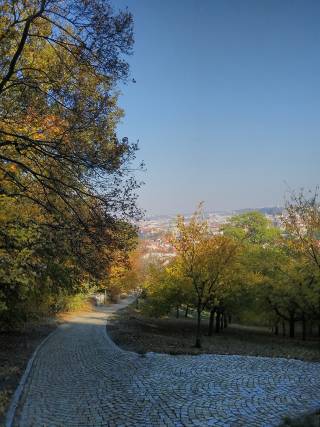
Skipping the boring topics such as paperwork, the existential need of finding a roof under which to live in made for a more interesting experience. Moving out of the dormitories, troubles speaking English with landlords, trying to avoid agency commission fees ... all of this constituted the accommodation-hunting grind of at least one of us. The good thing is that when it was done you could finally relax, go out and explore your new city! And, as I believe was the case with most of Europe, we were blessed with a very warm October, with little to no rainfall. Therefore if you’d ask me what I’ll remember my October in Prague by, it would be the exploration of its beautiful vistas. As someone who loves scenic views, I was thrilled by how quickly you can usually find an elevated place and be witness to one. There is indeed also much to see on the ground level; Prague boasts awesome architecture and co-exists with its Vltava River quite wonderfully. The celebrations of the first century of independent Czech statehood rounded out our city-observing and made for an even more thrilling experience.
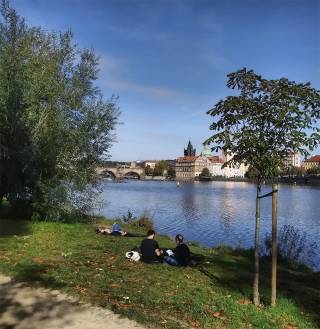
As for our academic life, at university we were greeted by our friendly and helpful programme coordinator professor Jiří Vykoukal. Now in November things are starting to heat up in regards to our studies and thesis writing so in one of the following posts I will try to sketch some particularities of studying in the Czech Republic and differences compared to the UK, as well as Croatia – my home country.
Another topic I’d love to touch on is the topic of the Czech language and people. My experience in this respect differs from that of my classmates due to being ethnically Czech, having previous knowledge of a century and a half old, now fairly irregular, enclave Czech, then learning Czech at an intermediate level while at UCL and now finally trying to speak it here as much as possible.
November 2018 – An important month for Czechs
The sunny days of October have long past. They’ve given way to various shades of grey and cold, chilling air. But for students in Prague this wasn’t a cue for going into hibernation. Quite the opposite, November has been a very eventful month. For starters, it owes a lot its eventfulness to remembering the fall of the communist regime set in motion 29 years ago. Of particular note is November 17th, a national holiday celebrated as the Struggle for Freedom and Democracy Day. On that day I took to visiting the manifestations which were dispersed all over the Národní třída street.
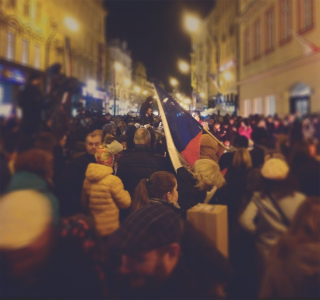
The manifestations varied from commemorative ones, such as lighting candles, to political ones, such as NGOs speaking up about certain issues. As you may have heard, there were also protests against the current government. Being Czech by heritage, but having grown up in a country (Croatia) that had a more liberal socialist system (and no foreign power keeping tabs on it), I have to say partaking at the manifestation was a rather strong and informative experience. But on the lighter side of things, I’ve also had a chance to sit down and listen to some stand-up comedy; this was also part of the programme!
Aside from the manifestations surrounding the national holiday, this month we’ve also had some great events organized by Prague Area Studies (PRAREAS), which is an umbrella term for some of the international programmes IMESS is also a part of. Guided in all events by our student coordinator Klára Žaloudková, we first paid a visit to the DOX Center for Contemporary Art. Although I’m not always the biggest fan of this kind of art, the Hard Times exhibition, for instance, was fruitful in encouraging reflection on the spirit of the times. On the aesthetic side of things, there was a remarkable exhibition of glass sculptures:
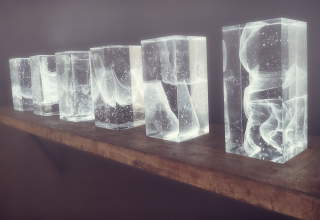
Next we paid a visit to Alphons Mucha’s famous Slav Epic exhibition. In what are 20 sizeable paintings, Mucha depicts pertinent points in the history of Slavic people.
We also went to watch a French movie called The Confession. It made for a hard, but cathartic experience that does perhaps too good of a job of depicting what it was like to be a political prisoner in communist Czech Republic (the movie is based on the real life story of Artur London).
We capped off the month by taking a day-trip to Kutná Hora – a small, yet notable tourist town.
There we visited several of the town’s historic churches, of which the quirky Sedlec Ossuary chapel probably stands out the most. I think this following picture taken inside is sufficient to explain why:
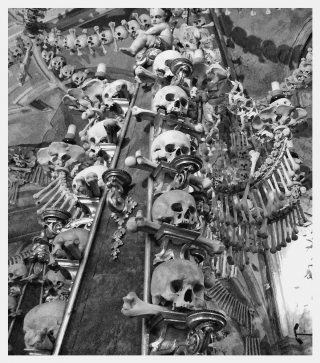
But I wouldn’t want to finish this blog entry with what many see as a distinctly macabre picture, so instead I’ll share a more festive picture, also from Kutná Hora :)
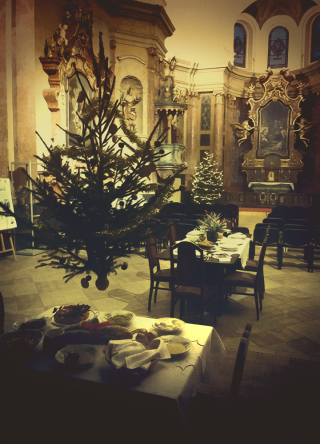
December 2018 – The Festive Month
Another cold-weathered month has gone by so it’s time for me to write about which cool events took place in it. The festive picture at the end of the last blog post was more than just casually placed; I wanted it to serve as a prelude to December. What was so different about December in particular though? Well, as is to be expected, Prague’s streets took on a more glittery look. Where there was nothing (or almost nothing), suddenly markets and Christmas trees popped up.
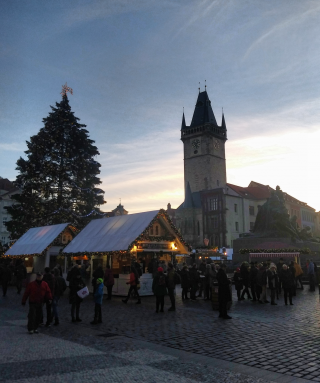
To be honest, I cannot talk about the whole Advent experience since I left before Christmas, but what I did manage to see was nice. Thematic events played their part too. For instance, Charles University had an “Advent at CU” night in one of its old city courtyards.
And the Prague Area Studies group organized yet another great event for us - a visit to the headquarters of the Man in Need (Člověk v tísni) NGO, followed by a Christmas dinner. Fun fact: it was during this dinner that my IMESS classmate Yu Bin and I recorded our Christmas wishes clip, which then made it into the SSEES season’s greetings video. This might also be my way of saying sorry if the background noise annoyed anyone.
But aside from holidays and festivities, this month also marked the end of the teaching part of the winter semester. Perhaps it’s now possible to sum up a few simpler observations about studying in the Czech Republic. Overall I’d have to say it’s not very different than studying in Croatia, yet studying in both of those countries is a pretty different experience than studying in the UK. There is, however, one minor common point between the UK and Czech Republic - teaching ends before Christmas. In Croatia you still get a whole month of teaching after the winter break, which is, to be honest, really nice since it also means not necessarily having to do essays or preparing for exams during the winter break! As for the differences, the British system is more strict on the student in terms of formal commitments. Example: there are multiple exam dates both in Croatia and in the Czech Republic, and the student can choose their preferred one. In Croatia (at least in most places I think) you can even try to raise your grade in subsequent exam dates, which doesn’t seem to be the case here in the Czech Republic from what I’ve gathered. However, it’s best to get things done well the first time, isn’t it? So let’s indeed “get things done well” in our January’s exams.
P.S. Happy New Year to everyone!
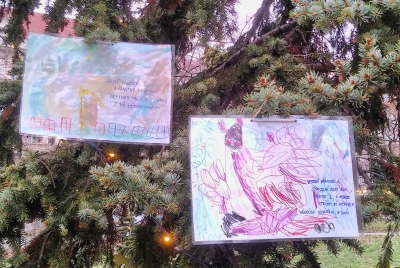
January 2019 – Halfway There
A new year’s under way. Instead of just plainly and boringly stating that, I’d like to share what the significance of the milestone is for me. I think three words suffice in describing it: time running out. I can’t help but notice that this is the year in which our studies and programme end, as well as that we’re halfway through our second year. There is no particular need to do some math in one’s head to become aware of this fact; the signs are more often than not right in front of our eyes. The exam period is over. Winter’s courses have gotten their conclusion. Some international students met along the way have already either went back to their homes or, as is the case with people in distinctly nomadic programmes, found new ones. With the students that remain you normally presumed radio silence as the default state of things, believing them to be busy or simply away. But most importantly, even if the signs hadn’t been there, your supervisor might have been doing the calculations and reminding work for you, (justly) warning you to kick it into gear.
The anxiety about time is not that unfounded anyway, especially not when thinking about the dissertation. Unlike UCL’s September dissertation deadlines, our deadline for submission is on the 10th of May. It effectively places it at the tail end of the summer semester teaching period, and while this is indeed still prior to the summer exams, it does seem like a tricky date, right? Another difference is the scope of the dissertation – it should be about twice the size of SSEES MA dissertations. Due to all this, should we happen to hang out after our first thesis seminar meeting in February, I suspect we will all be trying to gauge each other’s progress. No matter where I studied, I observed the following: us students have a certain curiosity about how others are doing in their studies. If the curiosity is successfully acted on, we may obtain a sense of comfort in finding each other in the same predicament.
That’s about all I have for January. As it wasn’t a particularly action packed month, writing about it mostly boiled down to ruminations. There’s still 3 weeks to go until the summer semester commences, meaning there isn’t much to do other than dissertation work and taking care of module registrations. Student activities should, however, slowly ramp up so let’s see what’s on the horizon!
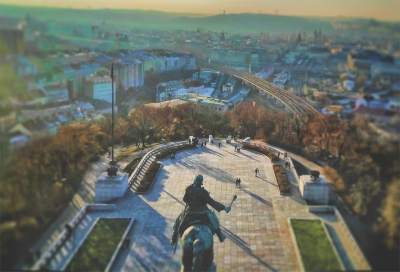
February 2019 – Spring Can’t Come Soon Enough
February was a tale of two halves. The first half: no classes or exams. The second half: the beginning of our last semester in this programme. I took the opportunity the first half of the month presented to do so some traveling and visited two cities - Karlovy Vary and Olomouc.
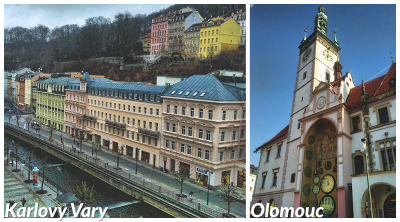
Karlovy Vary you’ve probably heard of and know it’s a famous spa city. Olomouc, on the other hand, might not be as familiar, but is pretty notable for being a student city. In hopes of ending up being surprised by something (which may also serve as an excuse for laziness), I visited both places having done little to no research beforehand. With Karlovy Vary, the tactic indeed worked! I found myself looking at shop windows and was surprised at how much Russian was inscribed there. Then I wound up in a nice Georgian restaurant where the staff spoke neither Czech nor English. I thought to myself “well, that’s strange”, and even tried using Croatian at one point. What I hadn’t known was that the city boasts a sizeable Russian population, however, thanks to technology and some overdue web browsing the mystery was resolved quickly, while still on-site.
The second half of the month, as I mentioned, marked the return of teaching. Remember how last time around I made a bet that we would be trying to gauge each other's dissertation progress after our first thesis seminar of the semester? Well, in all honesty I wasn't entirely right. The question *did* pop up once, but the topics revolved more so just about our life here in general. I get the impression we’re still to some extent getting the hang of things... or maybe that’s just me extrapolating the often brought up confusion with our multi-purpose online university system to a more general plane.
Fast forward to the end of the month, I'm now finishing this post in the once again lively student room in our campus in Jinonice. The weather finally can't and shouldn’t be complained about. The enjoyable rays of sun bring back fond memories of last year's spring time in London. Despite the period being quite intensive due to all the exams, here and there I took the time to take a stroll and enjoy the scenery. Spring really being my favorite season, I fully plan on doing the same in Prague. I’ve already scoped out some good benches for doing reading in my neighborhood of Karlín, which I plan to tell you more about in one of the posts to come. The upcoming period will be busy, but I know there will be many things to make it more pleasurable.
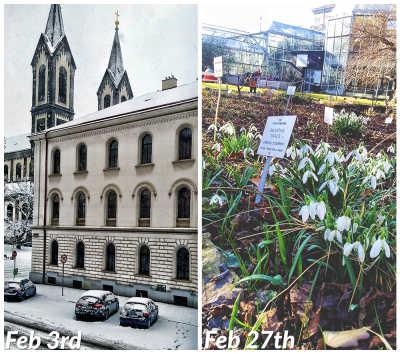
March 2019 – A Conference in Perspective
For this month’s blog entry I am very happy to be able to share something that was a great academic experience for me. I was among the 8 students who were given a wonderful opportunity not only to be present at last week’s international conference titled World War II: History and Memory, but to present at it as well. What makes the story interesting I think is the fact that our participation in the conference is directly linked to taking an “experimental” module on World War 2 public history and memory. Spearheaded by Professor Kateřina Králová, this module brought together 8 people of distinctly different backgrounds, tasked them with getting acquainted with key reading material and with formulating a topic they would present at the aforementioned conference. We then, of course, consulted with the professor and had presentation trial runs, the last of which was in fact in front of an audience of conference-attending academics who generously volunteered their time to give us a few tips.
On Thursday, March 28th it was time to officially kick off the conference. Talks took place in the beautiful historic building of the Faculty of Arts of Charles University, whose views had everyone taking their phones out to snap a photo or two… or more.
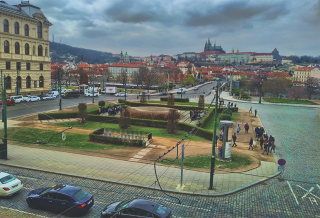
Most of the programme, however, took place in the next two days. We the students were carefully integrated into a brass of distinguished academics. What struck me about the conference, however, was that a cynic would really be hard-pressed to describe it as an “ivory tower” meeting of academics; members of NGOs were actively included in the programme with the explicit goal of linking research with practice. There’s more information on organizers, participants and their speeches at: www.bohems.fsv.cuni.cz/bohems-conference, while I will proudly add that my course and IMESS track classmate Rose was also one of the speakers!
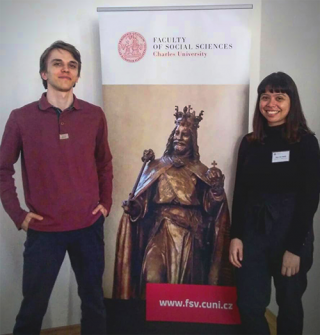
Reflecting on the module in a broader perspective, I’ve always found it very rewarding when I had to apply myself to research and solve a specific problem as part of coursework. Certainly that doesn’t negate the importance of obtaining knowledge from essential reading or the fact that it’s difficult to always be implementing a more active-oriented approach, but it can definitely make for a more exhilarating experience for the student – as it did in this case.
I’ve dedicated almost the entirety of this month’s post to the conference/module. In my defence, it was truly the highlight of the month and deserving of it anyway. I also think it can serve as a good example of my classes here in Prague and how satisfied I have been with them. Aside from the WW2 module, I have also not passed up the opportunity to continue studying Czech, was (as a non-historian) shown just how interesting history can be in a module that dealt with intellectual history, and have even been able to pursue my interests in technology by partaking in a module on cybersecurity. Overall, I’m very pleased!
April 2019 – The neighborhood of a study abroad student
I’m tempted to say that last month was, comparatively-speaking, great. I say comparatively because it’s May now, which is both the month of the thesis deadline and of exams. So if wanting to complain about stress and such, the initial statement stands. There is a lot of satisfaction, however, in finishing up all that’s been worked on for well over a year or so. And that’s exactly how I prefer to look at this period, as opposed to having a negative attitude.
But writing about writing isn’t particularly interesting. Instead I’m going to distract both myself and you, the readers, for a little while. In one of the previous posts I think I promised to go a bit into detail about the neighborhood I live in. From my experience, neighborhoods really can differ in what they provide, and this sometimes holds true even despite great proximity between them. So the neighborhood I live in Prague is called Karlín (or Prague 8)… and I would go as far as saying it’s the best neighborhood I’ve ever lived in.
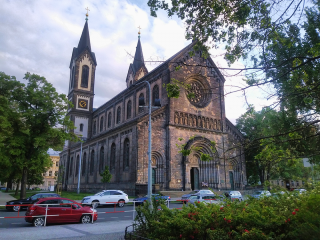
The most obvious reason is probably that the location’s reasonably central, but not on the tourists’ radar (!). Aside from that, the ambiance is charming; due to historic architecture streets more or less have this Austro-Hungarian feel to them, while most of the modern (mostly corporate) buildings are located towards the north ie. the river. Urban planning is quite good. What stands out in particular are the spacious streets which actually don’t have much traffic on them. Then there’s also some green spaces, most notably the famous Vítkov Hill that’s just nearby. The park where the picture above was taken is in fact even closer, only a couple of minutes by foot from where I live. Curiously enough, not all perceive Karlín the way I do. Because it used to be a gritty industrial district inhabited by members of lower classes, memory of its past influences present-day perceptions. In 2002 there was a massive flood that caused significant damage, but at the same time ushered in a new age for Prague 8. Some would, however, say what this age is really about is gentrification. The longer I live here, the more I learn about history and try to observe beyond face value, I do notice the social issues as well. Nonetheless, for me they don’t take away for the good sides I mentioned. And I simply enjoy living here.
At the very beginning I said I was writing this post during a busy and stressful period. Well, my point should be that having a good environment to live in makes it much easier. Be seeing you again next month!
May 2019 – The Finale, Pt.1
When trying to recollect everything that’s happened in the past month, most of it feels like a blur. The first half was all about finishing the thesis, and then that gave way to exams in the second half. Amidst it all, I do have to admit there was one thing that will remain sharply etched on my memory – the last “real” class I ever had. I can barely remember the first time I sat at a school desk, but what I can say with certainty is that back then I had no idea where the road would take me. Even as I was growing up and moving up grades, I couldn’t quite foresee that it would all end in the Czech Republic - the country of my ancestors (in Czech class of all classes). On a personal level, there is really a sense of meaningfulness to the story and path taken.
Aside from the last class ever, there was also a brief period of freedom at the end of the month which I will also remember fondly. Something I had wanted to participate in, and which is a cool thing the Charles University offers, are official student sports events. I missed out on at least a couple of such events due to obligations, but now there was finally one that I could go to. In what was a full-day of activities followed by concerts, I chose to play basketball and had a really fun time. These sorts of events are pretty valuable because it’s a good chance to get to know Czech students. As international students we mostly share classes with other international students, so that means that unless you actively put yourself out there you’re just never going to socialize with local students... which is something I feel like I could have done better during my stay here, but I do think my Czech improved and that I learned a lot about the country nonetheless.
Ah, and there was one more memorable event. My neighbourhood, which I wrote about last, time, was home to a big two-day free-for-all festival called United Islands of Prague 2019. There were multiple concert venues, each contained within their own “islands”. Coincidentally, one of the islands was called “The British Island”, and even had a good old Routemaster on display as a “café box”. The nod to London was much appreciated, as was the whole event.
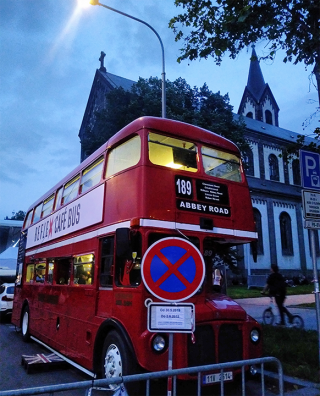
June 2019 - The Finale, Pt.2
As they say, all good things come to an end and my IMESS (and blogging) journey is no exception. One sunny mid-June’s day marked the end of the line, the thesis defence that took place on it now becoming a point of departure instead of the destination.
If looking back and trying to sum up this study abroad experience, I’d say that, unlike London, Prague and the Czech Republic never felt like a “different world” to me. The culture, architecture, university system etc. are not quite the same, but are also really not that dissimilar to Croatia. On that note, a lot of people would also say the same goes for language, and that learning one when knowing the other is more or less a breeze. Ha, not so much if you want to speak it more or less perfectly! A lot of substantial differences aside, at one point I even entertained the idea of making a list of all the false friends I stumbled onto, simply because there are so many of them and because they can lead to some properly confusing situations. Fortunately I did manage to get to a level where I could work with material in Czech for my thesis, which wouldn’t have been possible prior to IMESS. I also used Czech in all everyday situations, which didn’t end up too tragically, and was actually fun. Now, I said living in Prague was a different experience than living in London, but I had a wonderful time in both cities. When taking both years into consideration, I think I made the most of the “one year at UCL, one year at a university abroad” aspect of IMESS. Doing research on a topic I was interested in, gaining experience with methodology I wanted to know more about, integrating perspectives from other disciplines, learning another language such as Czech… I could do all of these things, with each of the two years providing its contribution to the goals and expectations I had before starting the programme.
With the end of June and of obligations at university, I am now back in Croatia doing a summer job and looking at the horizon to see which new journey lies ahead. If you found these blog posts interesting and/or have any questions about IMESS, feel free to reach out via social media or my personal blog I’m also currently updating. Finally, thank you to all of the readers for tuning in, and to all the people involved in the programme for their teaching and help throughout these two years!
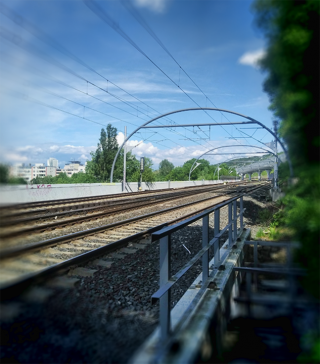
 Close
Close


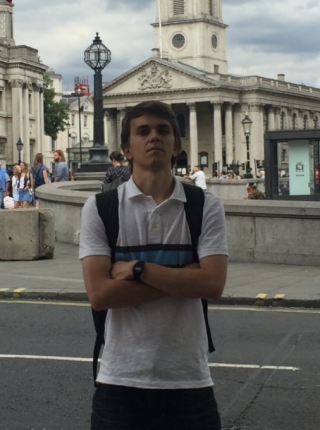 "I had my eyes on the IMESS programme for quite some time before applying to it. What I knew from doing research on the programme was that it's highly intriguing from an academic point of view and that it would offer something new to me. In short, there is a sharpening of focus on a specific area, encouraging of interdisciplinary, and there is great and varied methodological education..."
"I had my eyes on the IMESS programme for quite some time before applying to it. What I knew from doing research on the programme was that it's highly intriguing from an academic point of view and that it would offer something new to me. In short, there is a sharpening of focus on a specific area, encouraging of interdisciplinary, and there is great and varied methodological education..."